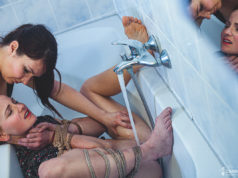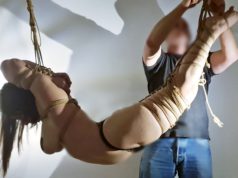Longing to be bound to the bedpost blindfolded? Or maybe being tied naked to a tree is more your cup of tea. If visions of bondage have been dancing through your head — or maybe just shyly peeking in before you firmly shut them out — this might help get them out of your head and into your life.
Remember the five benefits from the previous post? 1. Bondage can make sex even hotter. 2. You can get an endorphin rush. 3. Bondage is freeing. 4. It can help you connect intimately. 5. It can help you escape the everyday.
Well, the benefits of bondage don’t stop there! Here are five more reasons to try it even if you don’t consider yourself kinky. And be sure to read the safety notes at the end, because bondage can cause serious injury and even be fatal. Please play responsibly.
All quotes below are taken from Better Bondage for Every Body (Wanton Press, 2017).
- Bondage can boost your self-esteem.“Whatever body type, gender, or sexuality you happen to be, you can have these beautiful moments,” says Bri Burning, a curvy bondage lover. “Everyone looks sexy in rope,” adds Sous, who is also curvy. Bondage has a way of taking you out of your head — shutting up that annoying inner critic — and into delicious bodily sensations. There’s a misperception that bondage has to be degrading; it actually makes me feel elevated, connected, and beautiful in a way that no makeover ever could.
- It can help you get physically fitter.Some kinds of rope bondage, notably suspensions, are a workout! You might be using your core muscles, you might be teetering on your tiptoes using your calves, you might be using muscles you didn’t even know you had. Longtime bondage instructor (and ER nurse) Shay Tizianoeven lists “wanting a physical challenge or a ‘rope workout’” as one of the reasons someone might want to self-tie. Depending on the tie, you also might be working on your balance and bodily coordination. Please remember, however, the Zen truth that you are already perfect as you are. As bondage and sex educator Hedwig says, “You are not a project to be improved upon or a project to be solved.” There are excellent reasons for working out, but society’s misguided obsession with being thin isn’t one of them.
- It can help you forget chronic pain.“It’s the only time I feel completely free; free from pain and free from stress,” says Ashley B., who has severe sciatic pain. “Rope often helps to decrease my pain,” adds Lucythebrave, who has fibromyalgia. It might sound counterintuitive, but other bondage lovers who have chronic pain from a variety of conditions, like autoimmune disorders, report similar experiences. Butplease talk with your doctor before trying rope bondage for pain relief! You may have a different response or may even make your condition worse.
- It can help you feel young again. Aging can be a drag. Our bodies decline, our memory might start to go, we might be more prone to isolation and depression. But in Face It, author Vivian Dill, PhD, talks about how stimulating the brain with new associations and new things can help us feel younger. Trying bondage — or trying new kinds of ties if you’re already doing it — can feed the brain’s craving for novelty. Also, in French Women Don’t Get Facelifts, author Mireille Guiliano extols the healing power of touch and even calls it an antiaging medication. Being caressed by a rope partner totally counts!
- It can help you relax. Maybe sitting in meditation makes you want to run from the room, spa days aren’t in the budget, and the thought of doing yoga has your stomach in knots. But you probably know how big a toll stress can take on the body and mind. The good news is, rope bondage can put us into a meditation-like state! Neuromancer28, who has been a neuroscientist for 15 years, has studied the effects of rope bondage — including using electroencaphalography (EEG) to measure the brain activity of people in bondage. He notes that if the results of one case study of a full rope suspension can be extrapolated to suspensions in general, “In full suspension, when movement is highly restricted or difficult, the bottom experiences the most trance-like state — cognitive abandon — showing neural activity characteristic of a deeply meditative state (e.g., high theta EEG).”
I and many others who love to get tied up (a.k.a. rope bottoms) can tell you that less strenuous kinds of rope bondage can also induce a trancy, meditative state. Some rope bottoms even start to bliss out as soon as the first rope strands go on!
Before you rush out to follow your bliss, however:
- Research your partner carefully (ask about training and experience, and get references).
- Negotiate thoroughly (see Jay Wiseman’s long and short negotiation checklists).
- Communicate openly (about injuries, triggers, and desires beforehand, and about any pain, numbness, tingling, lightheadedness, or other weird feelings during).
- Avoid getting tied up in an isolated setting with someone you don’t know well. And if you’ll be suspending, learn how to evaluate a hardpoint — it’s your body literally on the line; don’t blindly trust your partner!
- Learn about preventing injuries; visit RemedialRopes.com for starters. Bondage can put you at risk of nerve damage, among other potential issues, so take safety seriously.
Want to try rope bondage? Check out Better Bondage for Every Body and The Little Guide to Getting Tied Up (Including Suspensions). Also watch the free instructional video series “How to Get Tied Up,” on YouTube’s Evie Vane channel.






